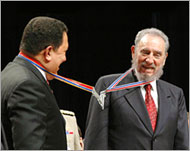Untitled Document
 |
Hugo Chavez (L) is an ally
of Cuba's Fidel Castro (R) |
Venezuelan activists facing trial for receiving money from a US-financed
organisation to promote a vote against President Hugo Chavez last year, will
get additional funding from the organisation, representatives say.
A Venezuelan judge last month ordered four members of the Sumate civil association
- which backed the 2004 referendum against Chavez - tried for conspiracy after
they received a grant last year from the National Endowment for Democracy (NED).
The endowment is a non-governmental organisation funded by the US Congress
to "promote democracy internationally".
New financing to Sumate could fuel already tense relations between Washington
and Chavez, an ally of Cuba's Fidel Castro, a long-time foe of the US.
Chavez brands members of Sumate traitors, while opposition leaders and some
US officials say the group has been targeted in a political witch hunt against
critics of the former army colonel elected as president.
Sumate has been granted $107,200 by the NED, financing which will go towards
a civil-rights and election education campaign, Sumate and the NED said.
"What we are doing is within the framework of the law, and does not violate
any regulation. But of course we know that the case against us is political
in character," Sumate representative Roberto Abdul said.
Strengthening democracy
The grant, which will help to "strengthen the democratic process in Venezuela"
is approved but in the final stages of being signed, NED spokeswoman Jane Riley
Jacobsen said.
Earlier this year, a Sumate leader, Maria Corina Machada, held talks with US
President George Bush in the White House.
The Venezuelan government slammed the meeting as a provocation.
The four Sumate members face up to 16 years in prison if they are convicted.
No date has been set for their trial.
Sumate had previously received a $31,000-grant from the NED.
Chavez has lambasted the endowment for backing opponents trying to unseat him.
Threat to democracy
Last month, US Senator John McCain, an Arizona Republican, wrote to Chavez asking
him to stop the prosecution of the four Sumate activists in a letter describing
the prosecution as a "grave threat to democracy" in Venezuela.
Chavez, a former army paratrooper elected in 1998 vowing to combat poverty,
often accuses Washington of trying to topple him and backing a 2002 coup which
he survived.
He won the August 2004 referendum, although opponents complained about fraud,
a charge international observers did not support.
US officials reject Chavez's plot charges, but they portray him as an authoritarian
who undermines democracy at home and destabilises the region by promoting "new
socialist" ideas.

